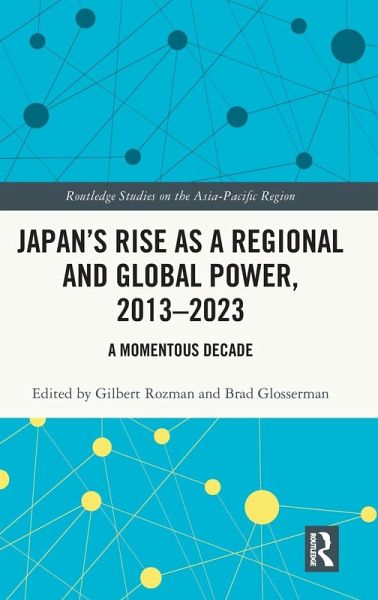
Japan's Rise as a Regional and Global Power, 2013-2023
A Momentous Decade
Herausgegeben: Rozman, Gilbert; Glosserman, Brad
Versandkostenfrei!
Versandfertig in 6-10 Tagen
144,99 €
inkl. MwSt.
Weitere Ausgaben:

PAYBACK Punkte
72 °P sammeln!
Rozman and Glosserman follow a momentous decade in the transformation of Japanese foreign policy from 2013 to 2023 that unveils Japan in a new light as a leading power more closely aligned with the United States than ever before but with distinct aspirations.The book presents a comprehensive chronology, a broad sweep of relations with regional partners, and an unprecedented look at new relations with Europe. Zeroing in on the legacy of Abe Shinzo, it pays special attention to the leadership of Kishida Fumio in response to the Biden administration, the Ukraine war, the growing alarm about China...
Rozman and Glosserman follow a momentous decade in the transformation of Japanese foreign policy from 2013 to 2023 that unveils Japan in a new light as a leading power more closely aligned with the United States than ever before but with distinct aspirations.
The book presents a comprehensive chronology, a broad sweep of relations with regional partners, and an unprecedented look at new relations with Europe. Zeroing in on the legacy of Abe Shinzo, it pays special attention to the leadership of Kishida Fumio in response to the Biden administration, the Ukraine war, the growing alarm about China, the swings in ties to South Korea, and the hopes to be a bridge with Southeast Asia and India.
It is a vital read for students of international relations in the Indo-Pacific and of Japan and advanced undergraduate courses on Japanese foreign policy, Asian regional studies and comparative international.
The book presents a comprehensive chronology, a broad sweep of relations with regional partners, and an unprecedented look at new relations with Europe. Zeroing in on the legacy of Abe Shinzo, it pays special attention to the leadership of Kishida Fumio in response to the Biden administration, the Ukraine war, the growing alarm about China, the swings in ties to South Korea, and the hopes to be a bridge with Southeast Asia and India.
It is a vital read for students of international relations in the Indo-Pacific and of Japan and advanced undergraduate courses on Japanese foreign policy, Asian regional studies and comparative international.














